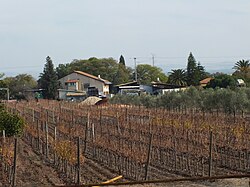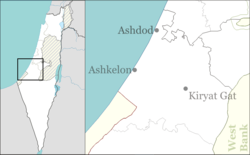Avigdor
Avigdor
אֲבִיגְדוֹר أفيغدور | |
|---|---|
| Hebrew transcription(s) | |
| • official | Avigedor |
 Avigdor | |
| Coordinates: 31°42′34″N 34°44′38″E / 31.70944°N 34.74389°E | |
| Country | |
| District | Southern |
| Council | Be'er Tuvia |
| Affiliation | Moshavim Movement |
| Founded | 1950 |
| Founded by | Jewish British Army veterans |
| Population (2022) | 815[1] |
| Website | www.moshav-avigdor.com |
Avigdor (Hebrew: אֲבִיגְדוֹר) a small moshav in southern Israel. Located south of Kiryat Malakhi and 11 km north of Kiryat Gat and covering 3.75 km², it falls under the jurisdiction of Be'er Tuvia Regional Council. In 2022 its population was 815.[1]
History
[edit]It was founded in 1950 by veterans of the British Army and was initially named Yaʿel, the initials of Hebrew Units for Transportation, the unit that the veterans belonged to during the war. The commander of the unit was Henry d'Avigdor-Goldsmid, the son of Sir Osmond Elim d’Avigdor-Goldsmid. Later the name was changed and now it derives its name from the Zionist Sir Osmond Elim d’Avigdor-Goldsmid, an Englishman, president of the Palestine Jewish Colonization Association between the years 1934–1939 that donated to the moshav the municipality.[2] It was founded on the land belonging to the depopulated Palestinian village of Qastina.[3]
The population is partly agriculturist, and their main occupations are dairy farming, turkeys and chicken and various field crops and partly free profession (lawyer, accountant, engineer, etc.) In the last years there is a development and building momentum.
References
[edit]- ^ a b "Regional Statistics". Israel Central Bureau of Statistics. Retrieved 21 March 2024.
- ^ Mapa's concise gazetteer of Israel (in Hebrew). Yuval Elʿazari (ed.). Tel-Aviv: Mapa Publishing. 2005. p. 14. ISBN 965-7184-34-7.
{{cite book}}: CS1 maint: others (link) - ^ Khalidi, Walid (1992). All That Remains: The Palestinian Villages Occupied and Depopulated by Israel in 1948. Washington D.C.: Institute for Palestine Studies. p. 131. ISBN 0-88728-224-5.
External links
[edit]- Village website (in Hebrew)


